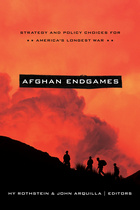
The United States and its allies have been fighting the Taliban and al-Qaeda in Afghanistan for a decade in a war that either side could still win. While a gradual drawdown has begun, significant numbers of US combat troops will remain in Afghanistan until at least 2014, perhaps longer, depending on the situation on the ground and the outcome of the US presidential election in 2012. Given the realities of the Taliban’s persistence and the desire of US policymakers—and the public—to find a way out, what can and should be the goals of the US and its allies in Afghanistan?
Afghan Endgames brings together some of the finest minds in the fields of history, strategy, anthropology, ethics, and mass communications to provide a clear, balanced, and comprehensive assessment of the alternatives for restoring peace and stability to Afghanistan. Presenting a range of options—from immediate withdrawal of all coalition forces to the maintenance of an open-ended, but greatly reduced military presence—the contributors weigh the many costs, risks, and benefits of each alternative.
This important book boldly pursues several strands of thought suggesting that a strong, legitimate central government is far from likely to emerge in Kabul; that fewer coalition forces, used in creative ways, may have better effects on the ground than a larger, more conventional presence; and that, even though Pakistan should not be pushed too hard, so as to avoid sparking social chaos there, Afghanistan’s other neighbors can and should be encouraged to become more actively involved. The volume’s editors conclude that while there may never be complete peace in Afghanistan, a self-sustaining security system able to restore order swiftly in the wake of violence is attainable.

Cyber weapons and the possibility of cyber conflict—including interference in foreign political campaigns, industrial sabotage, attacks on infrastructure, and combined military campaigns—require policymakers, scholars, and citizens to rethink twenty-first-century warfare. Yet because cyber capabilities are so new and continually developing, there is little agreement about how they will be deployed, how effective they can be, and how they can be managed.
Written by leading scholars, the fourteen case studies in this volume will help policymakers, scholars, and students make sense of contemporary cyber conflict through historical analogies to past military-technological problems. The chapters are divided into three groups. The first—What Are Cyber Weapons Like?—examines the characteristics of cyber capabilities and how their use for intelligence gathering, signaling, and precision striking compares with earlier technologies for such missions. The second section—What Might Cyber Wars Be Like?—explores how lessons from several wars since the early nineteenth century, including the World Wars, could apply—or not—to cyber conflict in the twenty-first century. The final section—What Is Preventing and/or Managing Cyber Conflict Like?—offers lessons from past cases of managing threatening actors and technologies.
READERS
Browse our collection.
PUBLISHERS
See BiblioVault's publisher services.
STUDENT SERVICES
Files for college accessibility offices.
UChicago Accessibility Resources
home | accessibility | search | about | contact us
BiblioVault ® 2001 - 2025
The University of Chicago Press









